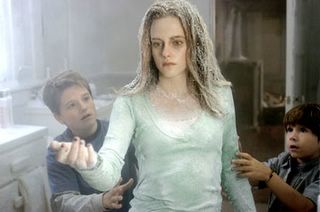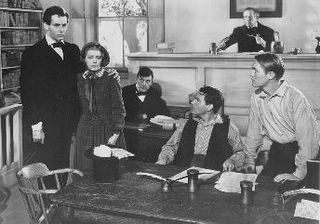Belated DVD Reviews
I wanted to post these reviews last night, but Blogger was misbehaving, as usual. I saw something last night on the page about "maintenance" from 9 pm to 11 on the 14th, but I think they added this little note after the outage initially occured. Bastards. How dare they provide me with a free forum from which to broadcast my thoughts to strangers the world over?
So, anyway, you've had to wait for today, a full 24 hours after the three discs have hit shelves. Oh, the shame of it all...
Zathura
I can't tell, based only on his IMDB biography, if director/comedian/screenwriter Jon Favreau had a happy or troubled childhood. It says that his father gifted him with the screenwriting software he used to craft Swingers, so that would imply that he has a good relationship with his folks.
But judging from the guy's films as a director, he's got some abandonment issues. This is Johnny Favs third film as a director, after the hilarious improv comedy Made, featuring Vince Vaughn's single best comic performance to date, and the surprisingly enjoyable Will Ferrell kiddie favorite Elf. It's also his third movie about neglectful parents potentially scarring their offspring for life.
In Made, Favs plays a mediocre boxer named Bobby, who's involved with a cruel single mother (Famke Janssen) who ignores and mistreats her cherubic daughter. In Elf, Will Ferrell travels from the North Pole to modern-day New York City to find his absent father (James Caan), who wants nothing to do with him once he arrives.
And now Zathura, a far-superior follow-up to the detestable 1995 Robin Williams disaster Jumanji, in which two brothers must work out their anger at one another and their divorcing parents while flying through space on a magical adventure. Walter (Josh Hutcherson) just wants to watch "Sportscenter" in peace when his busy dad (Tim Robbins) leaves him alone with his clingy younger brother Danny (Jonah Bobo...really...) and angsty teen sister (Kristen Stewart from Panic Room, looking much more...um...feminine).
Unfortunately, Danny pulls out an old 50's outer-space board game from the basement, and their house is magically transported into the outer reaches of the galaxy. The only way home is to finish the game, by reaching the planet Zathura, at which point the pieces reset back on Earth.
Whereas Jumanji focused on excessive CG effects (still relatively new back in '95), Favreau wisely keeps the movie a little smaller and more intimate. The family rarely leaves the house at all, and though a few new characters are introduced (including Punk'd veteran Dax Shepard as a stranded astronaut and a lot of fearsome-looking lizard aliens named Zorgons), the focus stays on Danny and Walter. And though the film's a bit too focused on whiz-bang action to ever really work as a comedy, there are a few moments where Favreau manages to get some pretty charming work out of these kids.
(For an example of the easy give-and-take between the young actors, take one scene, where a meteor has just taken out a chunk of the roof, and Walter and Danny see a field of stars above. "Look, outer space," says Danny. "No, that's just nighttime," replies Walter.)
Also, as the movie builds to its big finish, in which aliens are vanquished, games are won and brothers rediscover filial love, the proceedings get surprisingly intense. Not violent or morally troubling, mind you, but a bit more exciting and dangerous than the climax of most children's films. Both Zathura and Jumanji are based on storybooks by Chris Van Allsburg, and neither manages to capture his deft combination of terror and whimsy. Of course, neither film is as bad as Robert Zemeckis' Polar Express, another Van Allsburg adaptation.
Young Mr. Lincoln 
Here's my theory...When most people, who rarely if ever watch old movies, think about black and white Hollywood films of the past, they conjure up films like Young Mr. Lincoln. Staid. Proper. Unrealistic. A bit dry.
I'm not trying to knock John Ford's 1939 classic, which comes to Criterion DVD this week. It's a great film. It's just that, even in 1939 when Ford made the film, it was a bit old-fashioned. There had already been a sound film chronicling the life of Abraham Lincoln, in fact (Walter Huston played the part in that film). And the notion of using Lincoln as the embodiment of all that is noble in the American soul. And the forthright, earnest lead performance by Henry Fonda.
This film is a timeless piece of Americana. Unfortunately, Americans on the whole have little use for their own history or films that celebrate this heritage. Which is too bad, because Young Mr. Lincoln speaks to our own time in some surprising and important ways.
Rather than focusing on the better-known eras of Lincoln's life, such as his impoverished log-cabin-dwelling childhood or his Civil War Presidency, Ford and screenwriter Lamar Trotti center their film on Lincoln's years as an attorney in private practice, after spending a few years in the State Legislature but before attaining anything beyond local fame. They can't resist, however, including a lot of little references to Lincoln's later accomplishments: shots of Fonda in the top hat, Abe's introduction to Mary Todd (Marjorie Weaver) and even a mini-rivalry with his future debate opponent, Stephen Douglas (Milburn Stone). The finale, as well, metaphorically finds Lincoln trudging up a hill as the "storm" of the Civil War is brewing. It's heavy-handed, of course, but the movie's from 1939...I can cut it some slack.
The story finds Lincoln drawn into the case of two brothers accused of shooting a deputy sheriff. Everyone in town just assumes that the boys are guilty and deserve a hanging, but Lincoln (of course) is more thoughtful, trusting and insistant on the rule of law. It's that last point I'd like to linger on...Much is made in this film not only of Lincoln's virtue and strict adherence to law and order, but of his love of the law. This is one of the least-cynical portrayals of a lawyer in American film history.
An early scene finds Lincoln, after receiving some law books for free, reading by a riverbed. "Yes, of course, the law! It really is that simple!," he says. Yes, it's a bit corny and obvious, but Ford and Fonda play the moment as well as it could be played, and it has some impact. And I guess, considering that our present President feels that he and his administration are above the law, it's not all that obvious.
Metropolitan
Whit Stillman's 1990 romantic comedy may have kickstarted cinema's recent fixation on updating Jane Austen. Stillman's film doesn't actually adapt an Austen book so much as it merges the social world of her books with present-day New York. We have the same attention to the nuances of class differences, the same pithy "comedy of manners" style, the same verbal wit and dexterity with language and the same fascination with peering beneath the facades put up by supposedly extroverted, confident people.
So, you may have Stillman to blame for the sudden abundance of Austen adaptations and reinventions (including Amy Hecklering's stab at bringing Emma into the modern day, Clueless). But his original film retains all the idiosyncratic distance and sly rakishness it had on its much-lauded 1990 opening. One of the initial landmarks of the then-burgeoning American Indie scene, Metropolitan is still a pleasurable-enough romp 16 years on. Far better, at the very least, than Stillman's other two films, Barcelona and the flat Last Days of Disco.
The story begins when the once-wealthy outsider, Tom Townsend (Edward Clements) befriends a group of high society recent college grads calling themselves the Sally Fowler Rat Pack (after the girl who owns the apartment where they drink and hang out). Their rank includes the caddish Nick Smith (Chris Eigeman), nebbishy Charlie Black (Taylor Nichols) and Audrey Rouget (Carolyn Farina), who quickly develops a crush on Tom.
We follow them over the course of a single "season" in the New York Society calendar, as they follow up a series of off-screen "balls" and mixers with excessive drinking, intense conversations over their place in the world and the occasional game of strip poker. And as in Austen's slyly knowing novels, we gain insights into all of these people both by what they say and don't say.
Nick, for example, openly loathes Sally's new beau Rick Von Sloneker (Will Kempe, who returns as the character briefly in Last Days of Disco) because of his unspoken love for Sally. Tom, as well, pretends not to notice Audrey's affection for him, because he remains obsessed with his ex-girlfriend Serena (Elizabeth Thompson).
And so on. Metropolitan is the kind of movie where you know, inside of five minutes, whether or not you will appreciate its charms. I found it funny, engaging and breezy, and easily one of the most witty of the early 90's independents. Others, I suspect, might find its lack of momentum, coupled with Stillman's obvious delight in his own writing, tiresome.

No comments:
Post a Comment